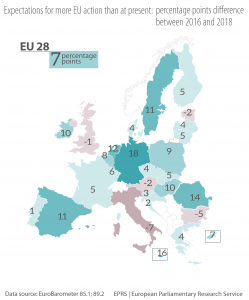Comparative Eurobarometer surveys on citizens’ ‘perceptions and expectations’, conducted for the European Parliament in 2016 and 2018, show that in 2018 57 % of EU citizens wanted to see increased EU involvement in foreign policy, an increase of seven percentage points compared with 2016. Despite this, there were still nine Member States where only a minority of the population wanted greater EU involvement in foreign policy. The lowest level of support was registered in Denmark (35 %) and the UK (40 %), while the highest was registered in Cyprus (84 %) and Spain (77 %). An increased desire for more EU action in foreign policy was shared by most Member States. In some countries levels even increased by double figures – in Germany (by 18 percentage points), Malta (16), Romania (14), the Netherlands, Spain, Sweden and Hungary (12, 11, 11 and 10 percentage points respectively). The most significant decrease in the share of citizens hoping for more EU involvement was registered in Italy (from 63 % to 56 %) and Bulgaria (from 55 % to 50 %).
Foreign policy is a broad area and, when asked about particular aspects of it, citizens often express different opinions. As concerns the diplomatic aspects of foreign policy, detailed answers in Eurobarometer Survey 89.2 show that more than seven out of ten citizens want the EU to speak with one voice in front of other big powers such as the US, Russia or China, or when addressing Middle-Eastern instability. However, other aspects, such as development cooperation or humanitarian aid, are not specifically addressed in the questionnaire. Furthermore, policy areas with a strong ‘external’ dimension, such as the fight against terrorism, democracy promotion, migration management, border protection, security and defence are dealt with as separate entries in the Eurobarometer.








Be the first to write a comment.